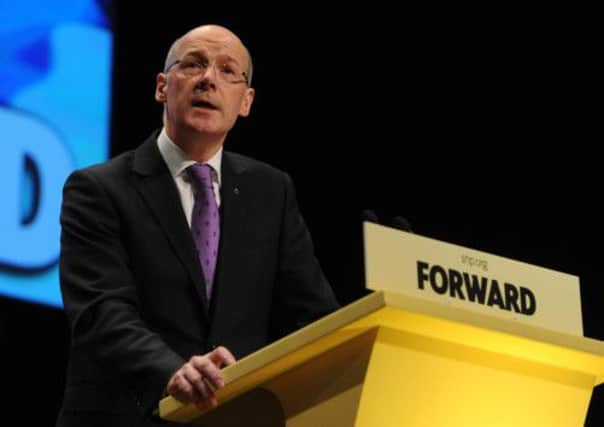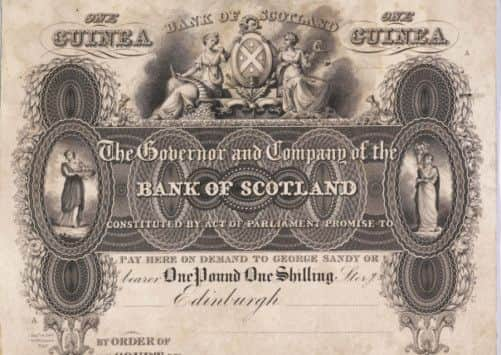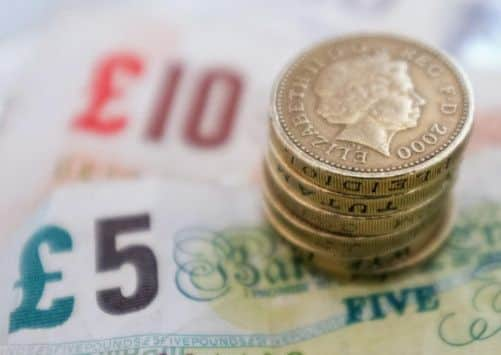Scottish independence: Banknotes safe - Swinney


• John Swinney insists Scottish banknotes will remain in post-independence currency union
• Swinney responds to threat that Bank of England could withdraw support for Scottish banknotes
Advertisement
Hide AdAdvertisement
Hide Ad• George Osborne accuses SNP iof “tying themselves in knots” over plans to retain sterling in event of Yes vote


John Swinney hit out at Chancellor George Osborne after the Treasury suggested Scottish banknotes could be lost under the SNP administration’s plans to retain the pound if Scotland votes to leave the UK in next year’s referendum.
A UK Government report, to be published tomorrow, raises questions about the continued existence of Scottish banknotes if there is a Yes vote.
But Mr Swinney argued Scottish banknotes would “remain in place within a post-independence currency union”.


The Scottish Government has already set out plans to retain the pound as currency if the country becomes independent, creating what has been described as a “sterling zone” with the rest of the UK.
The Treasury, however, has said the Bank of England, as the central bank of the UK, is responsible for regulating the issuing of notes by all commercial banks and its role would have to be reviewed under independence.
The report will say both Scottish and UK governments would need to agree if the commercial banks in an independent Scotland are to continuing issuing sterling notes as part of a currency union.
Advertisement
Hide AdAdvertisement
Hide AdMr Swinney rejected that, writing in The Scotsman: “An independent Scotland will retain the pound and the existing situation relating to Scottish banknotes - underpinned by the 2009 Banking Act - will remain in place within a post-independence currency union.”
Economics exports in the Fiscal Commission Working Group, set up by Alex Salmond, have already concluded that keeping sterling as the currency in an independent Scotland is both “sensible” and an attractive choice for the rest of the UK.
Mr Swinney said the work of this group shows “that it is in the best interests of both an independent Scotland and the rest of the UK to have a sterling zone”.
The UK Chancellor has insisted that a formal currency union “can only work with political and economic union”.
An article written by both Mr Osborne and Chief Secretary to the Treasury Danny Alexander said they could “understand why the proponents of independence wish a separate Scotland to enter into a formal currency union with the rest of the UK”.
But they argued the issue was “not as simple and straightforward as Scottish Government ministers pretend it is”.
The Finance Secretary hit out at “the scaremongering of Tory chancellor George Osborne - whose economic competence is further downgraded with every passing day”.
Mr Swinney argued: “An independent Scotland using the pound will mean sterling’s balance of payments will be massively boosted by Scotland’s huge assets, including North Sea oil and gas, which alone swelled the UK’s balance of payments by £40 billion in 2011-12.”
Advertisement
Hide AdAdvertisement
Hide AdHe also said that keeping the pound would be key to efforts to boost jobs and growth in Scotland after independence.
“With independence Scotland will control 100% of our revenues, which is what it needs to be build a stronger economy and fairer society,” the Finance Secretary said.
“The combination - which only comes with independence - of keeping the pound, accessing Scotland’s abundant resources and taking decisions on tax and other economic policies that are right for Scotland - is the best way to boost jobs and growth.”
Threat to Scottish banknotes
THE Bank of England could withdraw its backing for Scottish banknotes if Scots vote for independence next year, the Treasury will warn this week.
The Bank is currently responsible for regulating the issuing of sterling by commercial banks, ensuring Scottish banknotes are worth as much as Bank of England notes.
But in a report marking its first direct intervention in the constitutional debate, the Treasury will say that independence would “fundamentally transform” the role of the Bank of England with regards to Scotland.
The report will question the continued existence of Scottish banknotes – even under the SNP government’s plans to retain the pound in an independent Scotland.
The government of an independent Scotland may be forced to negotiate with the UK for the right to continue to issue its own banknotes, the Treasury report concludes.
Advertisement
Hide AdAdvertisement
Hide AdThe stark warning about the threat to the future of the historic Scottish banknote is expected to be made in the Treasury’s first analysis of the implications for the currency of independence, with Chancellor George Osborne due to unveil the findings in Glasgow tomorrow.
The claims were made as the Scottish Council for Development and Industry (SCDI) – which represents business and government agencies on economic growth – concludes in a new paper that Westminster may attempt to restrict the economic policy of an independent Scotland in areas such as slashing corporation tax, should the country retain the pound.
Institutions such as the Bank of Scotland and Clydesdale Bank issue their own notes, in what the Treasury says is a rare example of different notes printed and accepted across the same currency area.
Mr Osborne is expected to claim that the existence of Scottish banknotes is an example of Scotland’s distinctive identity in the UK, which shows both the strengths and flexibility of the Union.
But the Treasury will claim there is no guarantee similar arrangements could continue under independence, which would dramatically alter the Bank of England’s relationship with Scotland.
Banks could then be stopped from printing any new notes, with the Treasury likely to force the Scottish Government to negotiate on how long existing notes could remain in user.
The findings centre on the claim that Scotland leaving the Union would affect public confidence in the rest of the UK about the acceptance of Scottish banknotes.
John McLaren, an economist with the Centre for Public Policy for Regions (CPPR), said that, in the event of the Bank of England withdrawing its backing, Scottish banknotes already in use would still be accepted as legal tender in the short term, before being phased out.
Advertisement
Hide AdAdvertisement
Hide AdHe said: “Notes don’t stay in circulation that long, as they often become grubby and new ones are printed.
“If a banknote has a promise to pay the bearer on it, it wouldn’t change things that much in terms of what happens to the note someone holds. It would mean that over a couple of years we would stop using these banknotes.”
SNP ministers have set out plans to retain the pound if the country votes for independence in next year’s referendum, in what the First Minister has described as a “sterling zone” with the rest of the UK.
Mr Osborne said yesterday the SNP “are tying themselves in knots” over plans to retain the pound.
In an article co-written with Treasury Chief Secretary Danny Alexander, Mr Osborne said a currency union could only work as part of a political and economic union.
Meanwhile, former chancellor Alistair Darling said SNP ministers were backing themselves into a corner, between handing economic control over an independent Scotland to London or creating a Scottish currency.
Mr Darling, the leader of the Better Together campaign, said the Nationalists’ “contortions” on economic and monetary policy lacked credibility.
Mr Darling said: “The economy is going to be absolutely central to this debate about independence, and central to the economy is the currency we use.
Advertisement
Hide AdAdvertisement
Hide Ad“They [the Nationalists] are now saying they want a currency union. But they don’t seem to understand if you have a currency union, there are terms and conditions about your taxation, about your borrowing, about your spending.
“Whatever else that is, it is not independence.”
Economics experts in the Fiscal Commission Working Group, set up by Alex Salmond, have already concluded that keeping sterling in an independent Scotland is “sensible” and an attractive choice for the rest of the UK.
Deputy First Minister Nicola Sturgeon said it was the “common-sense position supported by the facts”.
“The combination – which only comes with independence – of keeping the pound, accessing Scotland’s abundant resources and taking decisions on tax and other economic policies that are right for Scotland, is the best way to boost jobs and growth,” she said.
Mr Salmond said the Chancellor had lost “all remaining economic credibility”.
“He has been downgraded by a second credit agency which once he boasted about,” Mr Salmond said. “He has spent the last week bickering with IMF economists whose support he once lauded. He will spend the next week with the UK economy teetering on the brink of a double-dip recession.
“He is a downgraded Chancellor without a remaining shred of credibility.”
A Scottish Government spokesman said that leading economists backed the plans for a shared currency under independence.
Advertisement
Hide AdAdvertisement
Hide AdThe spokesman said: “The existing situation relating to Scottish banknotes will remain in place within a post-independence currency union.
“An independent Scotland will retain the pound. The UK government has stated that there is no legal bar to an independent Scotland having sterling as its currency, and the evidence, including the views of world-leading economist Joseph Stiglitz, shows that it is in the best interests of both an independent Scotland and the rest of the UK to have a sterling zone.”
The Bank of Scotland and Clydesdale Bank declined to comment on the report.